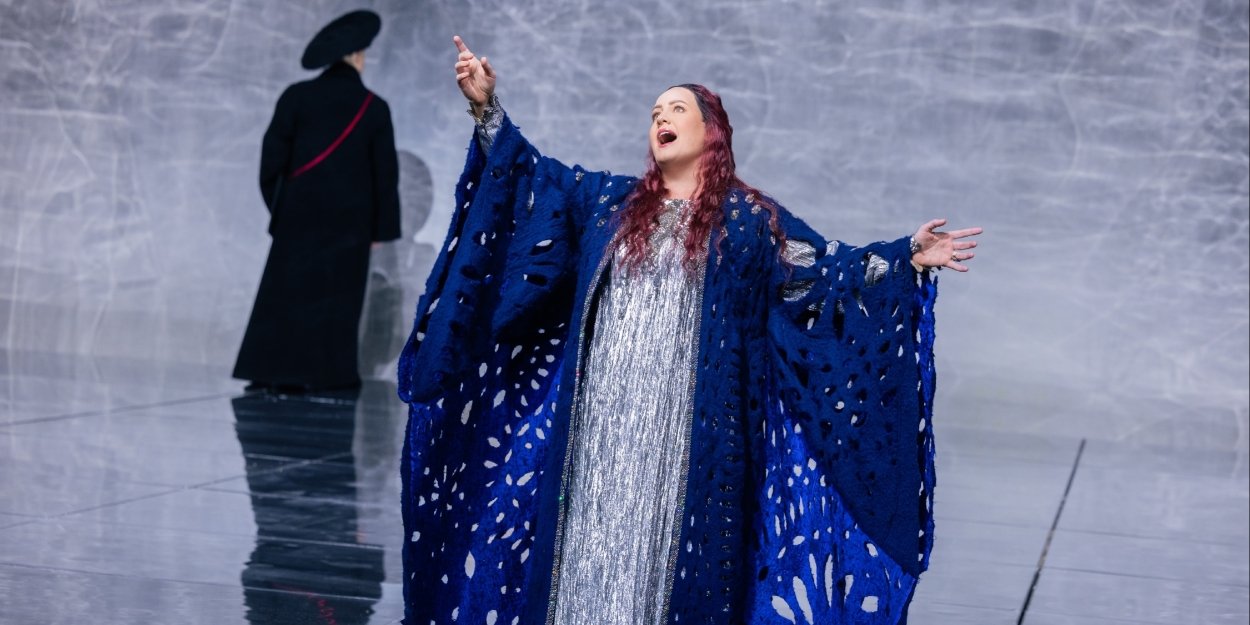Review: Strauss’s Powerhouse FRAU OHNE SCHATTEN Casts Big Shadow at the Met
Van den Heever, Volle Lead Stellar Cast--Stemme, Lindstrom, Thomas--in Rare Outing of Opera under Nezet-Seguin

Richard Strauss’s DIE FRAU OHNE SCHATTEN (THE WOMAN WITHOUT A SHADOW), with a libretto by his long-time collaborator, Hugo von Hofmannsthal, has made a triumphant return to the Met with a stellar cast and the Met Orchestra in peak form under Yannick Nezet-Seguin. It dazzled and glowed like few other evenings in recent memory, in a production by Herbert Wernicke, who died young, not long after its debut in 2001.
The cast, filled with outstanding performances by soprano Elza van den Heever as the Empress and baritone Michael Volle as the Dyer, along with soprano Lise Lindstrom as the Dyer’s Wife, tenor Russell Thomas as the Emperor and soprano Nina Stemme as the Nurse, held the audience in its thrall for the long work (four hours with lots of plot). I can’t remember an opera where there were so few walkouts during such a lengthy, esoteric evening. (Not counting Wagner’s RING, of course.)
The story--which the Met describes as a “heavily symbolic morality tale about love and marriage that unfolds in a fairy-tale world of multiple dimensions”--tells of two couples, the Emperor and Empress, who face an uncertain future at the hands of her father if they do not have a child, and Barak the Dyer, and his wife (referred only as the Dyer’s Wife), who differ on their views about whether to have a child.
The Nurse, a familiar of the Empress, is described as “a diabolical woman who hates anything human,” rounding out the quintet at the center of the opera, trying to convince the Dyer’s Wife to give up her shadow. Scenically, I found the realm of the Emperor and Empress was startingly breathtaking, while the lair of Barak and his wife was less appealing, particularly compared to the staging designed by Nathaniel Merrill and Robert O’Hearn that it replaced.
Who is the star of the show? That depends on the cast, even among equals. Sometimes it’s the singer performing the Dyer’s Wife, like the last time the Met performed the work, when Christine Goerke gave a star-making turn or when the great Birgit Nilsson debuted the role as the last new portrayal of her storied career.
But this time around, it was van den Heever, whose voice poured out like there was no tomorrow as the Empress and made her a figure to relate to, and Volle, who brought out the touching nuances of Barak the Dyer, who longs for the children that his wife won’t give him. He may not have had the most demanding of the work’s music but he had us hypnotized as a man who longs for something he cannot have.
Stemme created a fine villain as the Nurse who seems to be helping the Empress find her “shadow” (motherhood and the future it promises as a mortal)--I find her more convincing in a character role than as a star. Thomas was a very good Emperor when he warmed up; Lindstrom’s Dyer’s Wife was a little less convincing than some of the others I’ve heard in the part, though her competitive position among the principals certainly played a part in how well she fared.
Bass-baritone Ryan Speedo Green was luxury casting in the smaller role of the Spirit Messenger, while tenor Thomas Capobianco, baritone Aleksey Bogdanov and bass Scott Conner were sturdy as the coarse brothers of Barak, the banes of his wife’s existence.
The opera had its premiere in Vienna in 1919 but took another 47 years to make its way to the Met, during its opening season at Lincoln Center. (Its American premiere was in San Francisco in 1959.) Why so long? Various reasons: its artistic demands, its convoluted libretto, its length come into play. I would say that bringing together five principals filling those main roles is the number one reason for its lack of performance history in these parts, though the expense of putting on an opera of this size certainly must be a factor.
Any talk of shortcomings seems like caviling in a performance as thrilling as this one--particularly when we don’t know when the opera will be seen here again.
Photo: Elza van den Heever as the Empress. (Rear: Nina Stemme as the Nurse)
Credit: Evan Zimmerman/Met Opera
Richard Strauss’s DIE FRAU OHNE SCHATTEN will be heard through December 19. For more information about the opera and ticket availability, please see the Met’s website.
Reader Reviews
Videos

